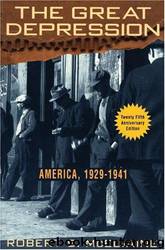The Great Depression: America, 1929-1941 by Robert S. McElvaine

Author:Robert S. McElvaine
Language: eng
Format: mobi, epub
Tags: United States - Economic conditions - 1918-1945, United States - History - 1933-1945, United States - History - 1919-1933, Depressions, Central, United States - Social conditions - 1933-1945, 20th Century, Economics, General, United States, Depressions - 1929 - United States, Americas (North, South, New Deal, 1929, 1933-1939, Economic History, West Indies), Business & Economics, History
ISBN: 9780812923278
Publisher: Times Books
Published: 1993-05-14T10:00:00+00:00
In those families where there was turmoil during the Depression, the children often suffered. Fathers (and mothers) might take out their frustrations on the children. As the effects of unemployment, shame, and worry became noticeable in parents, children grew more anxious. “The children all seem to be so excitable and high-strung these days,” said a New York settlement house kindergarten teacher. “I can’t help thinking it’s due to the distress at home.”
Why do we live like this, a child would wonder. Things used to be better. We’re not even clean anymore. Mama says the relief doesn’t give enough for soap. And the bedbugs. In our old house we never had anything like that! What’s wrong with Daddy? Times are hard, they say, but “all the other little girls are getting Easter dresses.” “Our friends have skates and we are not able to buy them.” Surely it’s not Daddy’s fault; he’s the greatest. Why, he’s been on relief longer than the other kids’ fathers—that’s something.
How can you go to school when the other kids know your family has been evicted before and people are saying your father’s not paying the rent now? Why should I be the one who has “to put a piece of cardboard in the sole of my shoe to go to school”? All the questions in a young mind. “My father he staying home. All the time he’s crying because he can’t find work. I told him why are you crying daddy, and daddy said why shouldn’t I cry when there is nothing in the house. I feel sorry for him. That night I couldn’t sleep.”
The special times that usually bring joy to children and parents were often the hardest to bear during the Depression. Christmas could be particularly painful. “My little children talking about Santa Claus,” a Texas father wrote to the President in 1934, “and I hate to see Xmas come this time because I know it will be one of the dullest Xmas they ever witnessed.” A Virginia mother described a similar problem. “My little boy was speaking of Santa Claus ‘He says why is it most children gets pretty toys and so many seems like they are rich and we so poor’ This made tears come in my eyes,” she said. “Then I told him if we are ever lucky enough to get work we will try to get him something pretty. I have to tell him of some happy day which may come.”
While many adults compared Franklin Roosevelt to Lincoln, Moses, or Jesus, for some children the President was Santa Claus. Two Rhode Island boys, for instance, wrote their annual Christmas letter in 1935, but mailed it to Washington rather than the North Pole. They wanted bicycles or microscope-chemistry sets. Other children who sought gifts from the jolly man in the White House were more practical. “We have no one to give us a Christmas presents,” wrote a ten-year-old Ohio girl, “and if you want to buy a Christmas present please buy us a stove to do our cooking and to make good bread.
Download
The Great Depression: America, 1929-1941 by Robert S. McElvaine.epub
This site does not store any files on its server. We only index and link to content provided by other sites. Please contact the content providers to delete copyright contents if any and email us, we'll remove relevant links or contents immediately.
International Integration of the Brazilian Economy by Elias C. Grivoyannis(111064)
The Radium Girls by Kate Moore(12032)
Turbulence by E. J. Noyes(8054)
Nudge - Improving Decisions about Health, Wealth, and Happiness by Thaler Sunstein(7710)
The Black Swan by Nassim Nicholas Taleb(7134)
Rich Dad Poor Dad by Robert T. Kiyosaki(6639)
Pioneering Portfolio Management by David F. Swensen(6303)
Man-made Catastrophes and Risk Information Concealment by Dmitry Chernov & Didier Sornette(6022)
Zero to One by Peter Thiel(5804)
Secrecy World by Jake Bernstein(4754)
Millionaire: The Philanderer, Gambler, and Duelist Who Invented Modern Finance by Janet Gleeson(4481)
The Age of Surveillance Capitalism by Shoshana Zuboff(4301)
Skin in the Game by Nassim Nicholas Taleb(4252)
The Money Culture by Michael Lewis(4210)
Bullshit Jobs by David Graeber(4194)
Skin in the Game: Hidden Asymmetries in Daily Life by Nassim Nicholas Taleb(4009)
The Dhandho Investor by Mohnish Pabrai(3769)
The Wisdom of Finance by Mihir Desai(3750)
Blockchain Basics by Daniel Drescher(3584)
